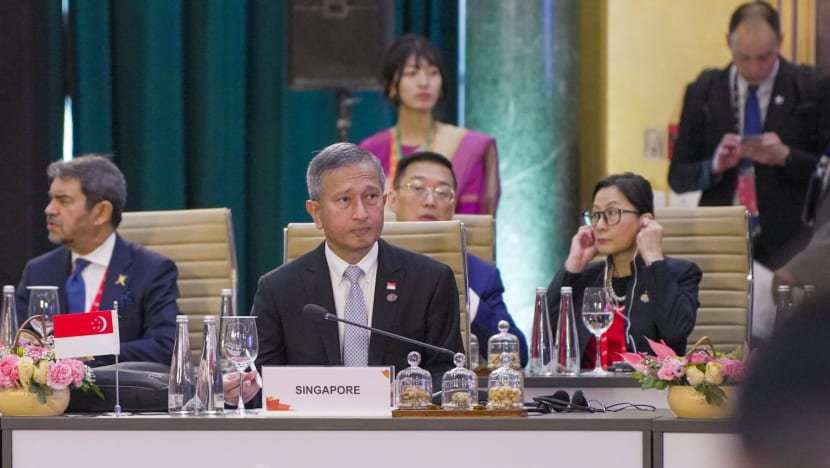Advertisement

Minister for Foreign Affairs Dr Vivian Balakrishnan at the G20 Foreign Ministers’ Meeting, in India on Mar 2, 2023. (Photo: Ministry of Foreign Affairs)
03 Mar 2023 08:03AM (Updated: 03 Mar 2023 08:04AM)
SINGAPORE: Singapore’s Foreign Minister Vivian Balakrishnan on Thursday (Mar 2) called for the United States and China to engage “intensively and comprehensively with each other” and de-escalate tensions for Asia, especially in the Taiwan Strait and the South China Sea.
Dr Balakrishnan was speaking at the G20 Foreign Ministers’ Meeting in New Delhi, India, where he highlighted the importance of supporting multilateralism to deal with global challenges.
“We need the leadership of both the US and China if we are to deal with any of the global challenges that confront us,” said Dr Balakrishnan.
He also warned against the bifurcation of technology and economies.
“I understand the national security imperative to have more resilient supply chains. But bifurcation taken too far will inevitably lead to increased inflation, slower technological progress and reduced growth and cooperation,” said Dr Balakrishnan.
“All of us need to support multilateralism; not just in words, but in exercising the self-restraint to accept a rules-based regime which will not necessarily give all of us everything that we want all the time,” he added.
The G20 meeting on Thursday took place under the shadow of Russia’s invasion of Ukraine, which marked its first anniversary last week. The US and its allies have criticised Moscow’s aggression as a threat to international peace and security and the rules-based order.
“The war in Ukraine needs to stop,” said Dr Balakrishnan. “All of us need to comply with the UN Charter and to defend the right of all nations, big or small, to have their independent sovereignty and territorial integrity fully respected.”
He added that the United Nations, the Bretton Woods Institutions and the World Trade Organization (WTO) needed to be reformed to reflect current realities and future and emerging needs.
“I want to appeal especially to the WTO, because Singapore is a tiny city state where trade is three times our GDP. Even if you have disagreements, reform, but do not paralyse the WTO,” said Dr Balakrishnan. “I am glad that the WTO Director-General just informed me that there is some progress on getting the WTO Appellate Body moving again, I hope, in the near future.”
Dr Balakrishnan also called upon the G20 to fulfil the Paris climate agreement. “We need to collectively increase our ambition if we want to deal effectively with climate change, which will inevitably also complicate food security for all of us.”
TERRORISM, SELF-RADICALISATION A THREAT
At the G20 meeting, Dr Vivian Balakrishnan also touched on other transboundary issues threatening Singapore’s security, such as illegal drugs and terrorism.
“Some of you may be aware that Singapore has one of the strictest laws, the harshest penalties for illegal drugs. Drugs are a national security, public health and law and order challenge. It reinforces our determination to continue on this path in order to keep our societies safe,” he said.
On the topic of terrorism, Dr Balakrishnan noted that even a modern and tiny city state like Singapore has its own share of self-radicalised individuals, typically young men. “They do not need to travel to become radicalised; they surf the internet,” he added.
The Internal Security Department said last month that two self-radicalised Singaporean teenagers, aged 15 and 16, were detained under the Internal Security Act (ISA) for terrorism-related activities. Another 18-year-old was also detained under the ISA.
“We need to remain vigilant to the fact that terrorist groups are using the Internet to disseminate highly polished propaganda which quite effectively radicalises young people. This is turn, can lead to lone-wolf attacks, communication with overseas cells and recruitment internationally,” said Dr Balakrishnan.
He said the real danger from terrorism is not just the innate damage, physical damage, or loss of lives, but the “loss of cohesion and social compact” it can cause within society.
“We do need to work closely together to share intelligence and work effectively. This is another example of a transboundary threat which requires a collective approach.”
Dr Balakrishnan also expressed sympathy to both Türkiye and Syria for the devastating earthquakes which had claimed thousands of lives in both countries.
“Natural disasters will occur from time to time. No country, no matter how well prepared, can cope all alone. This is a clear example where we do need to make common cause, especially when there is urgency to save lives as quickly as possible,” he said.
Wrapping up his speech, Dr Balakrishnan highlighted how all global challenges of the future – digital revolution, terrorism, climate change, pandemic response and the economy – need a young and educated population that is well-trained and familiar with the latest technologies.
There is also a need for skills retraining for adults, he said, adding that most people “are not going to have one job for the rest of their lives”.
“Skills development is a project we are working closely with India in. We have established three skills centres in New Delhi, Rajasthan and Assam since 2012. The challenge now is to scale up,” he added.
Dr Balakrishnan will meet India’s Minister of External Affairs S Jaishankar and National Security Adviser Ajit Doval on Friday before departing India.

